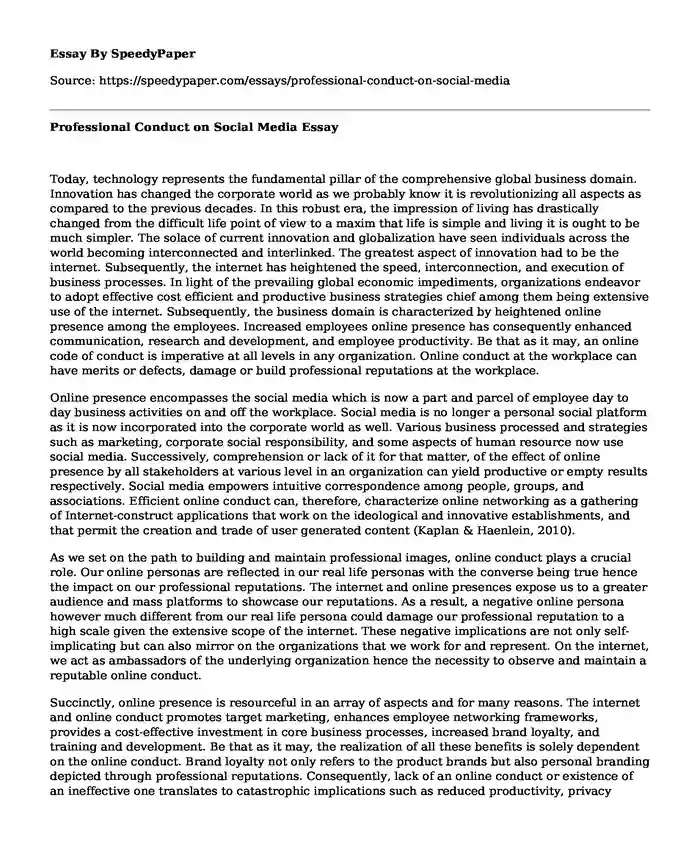
| Type of paper: | Essay |
| Categories: | Business Social media |
| Pages: | 3 |
| Wordcount: | 637 words |
Today, technology represents the fundamental pillar of the comprehensive global business domain. Innovation has changed the corporate world as we probably know it is revolutionizing all aspects as compared to the previous decades. In this robust era, the impression of living has drastically changed from the difficult life point of view to a maxim that life is simple and living it is ought to be much simpler. The solace of current innovation and globalization have seen individuals across the world becoming interconnected and interlinked. The greatest aspect of innovation had to be the internet. Subsequently, the internet has heightened the speed, interconnection, and execution of business processes. In light of the prevailing global economic impediments, organizations endeavor to adopt effective cost efficient and productive business strategies chief among them being extensive use of the internet. Subsequently, the business domain is characterized by heightened online presence among the employees. Increased employees online presence has consequently enhanced communication, research and development, and employee productivity. Be that as it may, an online code of conduct is imperative at all levels in any organization. Online conduct at the workplace can have merits or defects, damage or build professional reputations at the workplace.
Online presence encompasses the social media which is now a part and parcel of employee day to day business activities on and off the workplace. Social media is no longer a personal social platform as it is now incorporated into the corporate world as well. Various business processed and strategies such as marketing, corporate social responsibility, and some aspects of human resource now use social media. Successively, comprehension or lack of it for that matter, of the effect of online presence by all stakeholders at various level in an organization can yield productive or empty results respectively. Social media empowers intuitive correspondence among people, groups, and associations. Efficient online conduct can, therefore, characterize online networking as a gathering of Internet-construct applications that work on the ideological and innovative establishments, and that permit the creation and trade of user generated content (Kaplan & Haenlein, 2010).
As we set on the path to building and maintain professional images, online conduct plays a crucial role. Our online personas are reflected in our real life personas with the converse being true hence the impact on our professional reputations. The internet and online presences expose us to a greater audience and mass platforms to showcase our reputations. As a result, a negative online persona however much different from our real life persona could damage our professional reputation to a high scale given the extensive scope of the internet. These negative implications are not only self-implicating but can also mirror on the organizations that we work for and represent. On the internet, we act as ambassadors of the underlying organization hence the necessity to observe and maintain a reputable online conduct.
Succinctly, online presence is resourceful in an array of aspects and for many reasons. The internet and online conduct promotes target marketing, enhances employee networking frameworks, provides a cost-effective investment in core business processes, increased brand loyalty, and training and development. Be that as it may, the realization of all these benefits is solely dependent on the online conduct. Brand loyalty not only refers to the product brands but also personal branding depicted through professional reputations. Consequently, lack of an online conduct or existence of an ineffective one translates to catastrophic implications such as reduced productivity, privacy concerns, and destruction of professional reputations.
In conclusion, the backdrop above outlines the pros and cons of online conduct at the workplace. Successively, these merits and defects are mirrored in the development and destruction of professional reputations respectively. Plausibly, professional reputation is a function of online conduct.
References
Kaplan, A., & Haenlein, M. (2010). Users of the world, unite. The challenges and opportunities of Social Media. Business Horizons, 53(1), 5968.
Cite this page
Professional Conduct on Social Media. (2019, Oct 07). Retrieved from https://speedypaper.com/essays/professional-conduct-on-social-media
Request Removal
If you are the original author of this essay and no longer wish to have it published on the SpeedyPaper website, please click below to request its removal:
- HRM Essay Example on the Five Dysfunctions of a Team
- Free Essay on Low-Cost Airline Industry: Sustainable Competitive Development
- Essay Example: General Principles of Healthcare Budgeting
- Case Study Based On Gibb's Reflective Model. Free Essay.
- Free Essay Sample: Market Research in Nike
- Summary of Incident Reporting Process in a Long-Term Care Setting. Free Essay
- Essay Sample on Linguistics Anthropology
Popular categories




